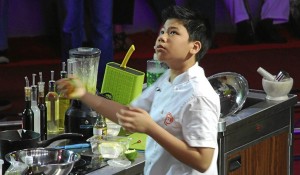Young kitchen wizards cook up a storm
The final cook-off among four survivors in the local “Junior Master Chef” recently was a thrilling contest right down to the wire, with the top two bets, Kyle and Phillip, separated by less than one percentage point at the tally.
The other two did their best to end up in the money, but when the smoke in the studio kitchen cleared, it was Kyle who had brought home the sizzling bacon—over P1 million in cash and in kind, plus all sorts of other perks.
On point of production, however, the show’s pacing sagged towards the end, as the judges evaluated the last round of dishes.
The obvious excuse was that they couldn’t talk with their mouths full. But even more obviously, the production could have worked around that limitation by assigning voiceover ad-libs or spot interviews to a nonjuror.
Since this wasn’t done, it was disconcerting for viewers to hear studio staffers telling each other to do this or that to keep the show going during “savoring” intervals.
Article continues after this advertisementAnother lapse was the less than scintillating performance of some chef-jurors. We don’t doubt that they’re masters of their culinary discipline, but throughout the competition, they were skittish about relating to the contestants.
Article continues after this advertisementSince the competitors were children, the jurors may have felt that they would be unable to make negative notes, so the early rounds of the tilt were characterized mostly by the jurors’ heaping resounding praises on the kids.
If practically everything they did was so amazingly wonderful, how would the young cooks improve from week to week?
We viewed the original Australian edition of the tilt rather regularly, and we didn’t see its contestants treated with kid gloves. Yes, the jurors accentuated the positive, but they also pointed out the young cooks’ weak points, motivating them to do better.
In addition, the jurors there were more TV-savvy and projected strong (if supportive) personalities, unlike the local jurors, who were too eager to please and not hurt feelings, and thus came off as relative wimps.
Happily, by the time last week’s finals came around, the jurors were giving more helpful notes, both positive and negative, on the surviving cooks’ dishes.
Most impressively, the four finalists had become confident and versatile cooks who thought up unique dishes that proved that they had learned a lot from the competition—even as persons.
We trust that this happy outcome wasn’t lost on the young people who viewed the tilt, and that it inspired them to also learn how to cook for their own hungry and appreciative families!
